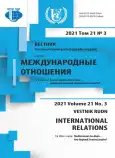Germany’s Position on the Greek-Turkish Dispute: Intergovernmental Theory vs. Neofunctionalism
- Authors: Ivkina N.V.1
-
Affiliations:
- RUDN University
- Issue: Vol 21, No 3 (2021): Mediterranean Sea Basin – New Regional Security Complex?
- Pages: 487-497
- Section: THEMATIC DOSSIER
- URL: https://journal-vniispk.ru/2313-0660/article/view/320296
- DOI: https://doi.org/10.22363/2313-0660-2021-21-3-487-497
- ID: 320296
Cite item
Full Text
Abstract
The article identifies Germany’s position on the Greek-Turkish dispute in the Aegean Sea from the point of the intergovernmentalist and neofunctionalist theories. The relevance of the research topic is due to the constantly emerging contradictions between Turkey and Greece in the Eastern Mediterranean, as well as the need for the third parties to intervene in this dispute. The subject of the study is the German position, which is explained by the desire of the country to become a mediator. In addition, in European historiography on the integration there is an ongoing debate as to whether countries are guided in their foreign policy decisions by a common European set of norms, principles and values, or still by their own national interests. The aim of the study is to identify the principles that Germany follows in determining the political vector of its foreign policy, using the example of the dispute between Turkey and Greece in the Aegean Sea, and correlate them with the theories of intergovernmentalism and neofunctionalism. The research methods are comparative analysis for defining the correlation of the postulates and selected theories with the practical steps taken by Germany to resolve the Greek-Turkish dispute, as well as the institutional method, which allows determining the role and place of the state in the system of pan-European decision-making. The results of the study are presented in the form of a correlation of the main criteria of the theories of intergovernmentalism and neofunctionalism with the identified practical steps of Germany to resolve the dispute between Turkey and Greece in the Eastern Mediterranean. The conclusion identifies Germany’s commitment to one of the two theories for each of the selected criteria.
About the authors
Natalia Viktorovna Ivkina
RUDN University
Author for correspondence.
Email: ivkina-nv@rudn.ru
ORCID iD: 0000-0001-8654-7629
PhD in History, Associate Professor, Department of Theory and History of International Relations
Moscow, Russian FederationReferences
- Atrashkevich, A. N. (2019). Turkey and Greece: Political and economic relations within the conflict circumstances (1999-2017). Vestnik RUDN. International Relations, 19(4), 675-689. (In Russian). https://doi.org/10.22363/2313-0660-2019-19-4-675-689
- Pimenova, O. (2019). Legal integration in the European Union and the Eurasian Economic Union: Comparative analysis. International Organisations Research Journal, 14(1), 76-93. (In Russian). https://doi.org/10.17323/1996-7845-2019-01-05
- Avar, Y., & Lin, Y. C. (2019). Aegean disputes between Turkey and Greece: Turkish and Greek claims and motivations in the framework of legal and political perspectives. International Journal of Politics and Security, 1(1), 57-70
- Bac, M. (2005). Turkey’s political reforms and the impact of the European Union. South European Society and Politics, 10(1), 17-31. https://doi.org/10.1080/13608740500037916
- Beach, D., & Pedersen, R. B. (2019). Process-tracing methods: Foundations and guidelines. Ann Arbor: University of Michigan Press
- Bergman, J. (2018). Neofunctionalism and EU external policy integration: The case of capacity building in support of security and development (CBSD). Journal of European Public Policy, 26(9), 1253-1272. https://doi.org/10.1080/13501763.2018.1526204
- Couloumbis, T. (1994). Introduction: The impact of EC membership on Greece’s foreign policy profile. In P. Kazakos & P. Ioakimidis (Eds.), Greece and EC membership evaluated (pp.189-198). London: Pinter Publishers
- Cremona, M., & Micklit, H.-W. (2016). Private law in the external relations of the EU. Oxford: Oxford University Press
- Gonenc, D., & Durmaz, G. (2020). The politics of neoliberal transformation on the periphery: A critical comparison of Greece and Turkey. Southeast European and Black See Studies, 20(4), 617-640. https://doi.org/10.1080/14683857.2020.1843284
- Haas, E. (1961). International integration: The European and the universal process. International Organization, 15(3), 366-392.
- Haas, E. B. (1968). The Uniting of Europe. Stanford: Stanford University Press.
- Haas, E. B. (2004). The Uniting of Europe: Political, social and economic forces, 1950-1957. Stanford: Stanford University Press.
- Heraclides, A. (2010). The Greek-Turkish conflict in the Aegean: Imagined enemies. Palgrave Macmillan.
- Hooghe, L. & Marks, G. (2009). A postfunctionalist theory of european integration: From permissive consensus to constraining dissensus. British Journal of Political Science, 39(1), 1-4. https://doi.org/10.1017/S0007123408000409
- Hooghe, L., Lenz, T., & Marks, G. (2019). A theory of international organization. Oxford: Oxford University Press.
- Kaplan, L. S. (1994). NATO and the United States. Updated edition. The enduring alliance. New York: Twayne Publishers.
- Lindberg, L. (1963). The Political dynamics of European integration. Stanford: Stanford University Press.
- Middelaar, L. (2019). Alarums and excursions: Improvising politics on the European stage. Newcastle: Agenda Publishing.
- Moravcsik, A. (1998). The choice for Europe. Ithaca: Cornell.
- Moravcsik, A. (2018). Preferences, power and institutions in 21st-century Europe. Journal of Common Market Studies, 56(7), 1648-1674. https://doi.org/10.1111/jcms.12804
- Riddervold, M., & Rosén, G. (2016). Trick and treat: How the commission and the European Parliament exert influence in EU foreign and security policies. Journal of European Integration, 38(6), 687-702. https://doi.org/10.1080/07036337.2016.1178737
- Rumelili, B. (2004). The European Union’s impact on the Greek-Turkish conflict. Working Papers Series in EU Border Conflicts Studies. Bogazici University, University of Birmingham
- Schmidt, V. (2019). Politicization in the EU: Between national politics and EU political dynamics. Journal of European Public Policy, 26(7), 1018-1036. https://doi.org/10.1080/13501763.2019.1619189
- Stephanou, C., & Tsardanides, C. (1991). The EC factor in the Greece - Turkey - Cyprus Triangle. In D. Constas (Ed.), The Greek-Turkish conflict in the 1990s: Domestic and external influences (pp. 207-230). New York: St. Martin’s Press
- Tranholm-Mikkelsen, J. (1991). Neo-functionalism: Obstinate or obsolete? Millenium, 20(1), 1-22. https://doi.org/10.1177/03058298910200010201
- Yildiz, E. (2020). The Conflict between Greece and Turkey Mediterranean sea (international maritime law study). Jurnal Hukum, 36(2), 126-137. https://doi.org/10.26532/jh.v36i2.11393
Supplementary files









